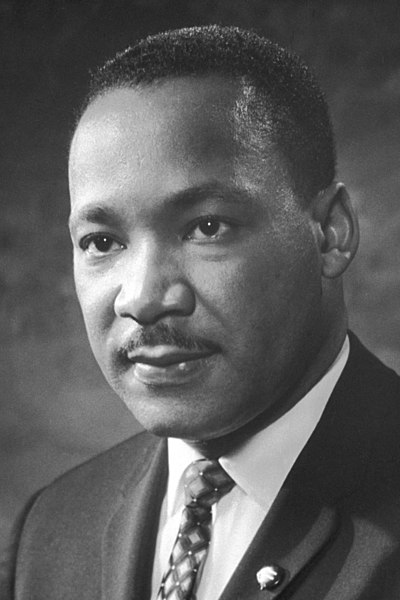Heute Abend möchte ich diese erhabene und historische Plattform nutzen, um über das zu sprechen, was mir als das dringendste Problem erscheint, mit dem die Menschheit heute konfrontiert ist. Der moderne Mensch hat diese ganze Welt an eine ehrfurchtgebietende Schwelle der Zukunft gebracht. Er hat neue und erstaunliche Gipfel des wissenschaftlichen Erfolgs erreicht. Er hat Maschinen hervorgebracht, die denken, und Instrumente, die in die unergründlichen Weiten des interstellaren Raums blicken. Er hat gigantische Brücken gebaut, die die Meere überspannen, und gigantische Gebäude, die den Himmel küssen. Seine Flugzeuge und Raumschiffe haben die Entfernungen in den Schatten gestellt, die Zeit in Ketten gelegt und Autobahnen durch die Stratosphäre gemeißelt. Dies ist ein schillerndes Bild des wissenschaftlichen und technischen Fortschritts des modernen Menschen.
Doch trotz dieser spektakulären Fortschritte in Wissenschaft und Technik und der noch unbegrenzten, die noch kommen werden, fehlt etwas Grundlegendes. Es gibt eine Art Armut des Geistes, die in krassem Gegensatz zu unserem wissenschaftlichen und technologischen Reichtum steht. Je reicher wir materiell geworden sind, desto ärmer sind wir moralisch und geistig geworden. Wir haben gelernt, in der Luft zu fliegen wie die Vögel und im Meer zu schwimmen wie die Fische, aber wir haben nicht die einfache Kunst gelernt, als Brüder zusammenzuleben.
Jeder Mensch lebt in zwei Bereichen, dem inneren und dem äußeren. Das Innere ist das Reich der geistigen Ziele, die sich in Kunst, Literatur, Moral und Religion ausdrücken. Das Äußere ist der Komplex von Geräten, Techniken, Mechanismen und Instrumenten, mit deren Hilfe wir leben. Unser Problem heute ist, dass wir zugelassen haben, dass sich das Innere im Äußeren verliert. Wir haben zugelassen, dass die Mittel, mit denen wir leben, die Ziele, für die wir leben, überholen. So vieles im modernen Leben lässt sich in dem fesselnden Diktum des Dichters [Henry David] Thoreau zusammenfassen: „Verbesserte Mittel für einen unverbesserlichen Zweck“. Dies ist das ernste Dilemma, das tiefe und quälende Problem, mit dem der moderne Mensch konfrontiert ist. Wenn wir heute überleben wollen, muss unser moralischer und geistiger „Rückstand“ beseitigt werden. Vergrößerte materielle Kräfte bedeuten vergrößerte Gefahr, wenn es kein entsprechendes Wachstum der Seele gibt. Wenn das „Äußere“ der menschlichen Natur das „Innere“ unterdrückt, beginnen sich dunkle Gewitterwolken in der Welt zu bilden.
Dieses Problem des geistigen und moralischen Rückstands, das das Hauptdilemma des modernen Menschen darstellt, drückt sich in drei größeren Problemen aus, die aus dem ethischen Infantilismus des Menschen erwachsen. Jedes dieser Probleme, obwohl es separat und isoliert zu sein scheint, ist untrennbar mit dem anderen verbunden. Ich beziehe mich auf Rassenungerechtigkeit, Armut und Krieg.
Martin Luther King Jr.
Quellennachweis:
Dr. Rev. Martin Luther King Jr. (1929-1968),
US-amerikanischer Baptistenpastor und Bürgerrechtler, er erhielt 1964 den Friedensnobelpreis und wurde am 4. April 1968 bei einem Attentat erschossen.
https://de.wikipedia.org/wiki/Martin_Luther_King
Martin Luther King, 1964
Photo from the Nobel Foundation archive.
This Swedish photograph is in the public domain in Sweden because one of the following applies:
The work is non-artistic (journalistic, etc.) and has been created before 1 January 1971 (SFS 1960:729, § 49a).
The photographer is not known, and cannot be traced, and the work has been created before 1 January 1951 (SFS 1960:729, § 44). If the photographer died before 1951, {{PD-old-70}} should be used instead of this tag.
The quest for peace and justice
(Auszug)
This evening I would like to use this lofty and historic platform to discuss what appears to me to be the most pressing problem confronting mankind today. Modern man has brought this whole world to an awe-inspiring threshold of the future. He has reached new and astonishing peaks of scientific success. He has produced machines that think and instruments that peer into the unfathomable ranges of interstellar space. He has built gigantic bridges to span the seas and gargantuan buildings to kiss the skies. His airplanes and spaceships have dwarfed distance, placed time in chains, and carved highways through the stratosphere. This is a dazzling picture of modern man’s scientific and technological progress.
Yet, in spite of these spectacular strides in science and technology, and still unlimited ones to come, something basic is missing. There is a sort of poverty of the spirit which stands in glaring contrast to our scientific and technological abundance. The richer we have become materially, the poorer we have become morally and spiritually. We have learned to fly the air like birds and swim the sea like fish, but we have not learned the simple art of living together as brothers.
Every man lives in two realms, the internal and the external. The internal is that realm of spiritual ends expressed in art, literature, morals, and religion. The external is that complex of devices, techniques, mechanisms, and instrumentalities by means of which we live. Our problem today is that we have allowed the internal to become lost in the external. We have allowed the means by which we live to outdistance the ends for which we live. So much of modern life can be summarized in that arresting dictum of the poet Thoreau1: “Improved means to an unimproved end”. This is the serious predicament, the deep and haunting problem confronting modern man. If we are to survive today, our moral and spiritual “lag” must be eliminated. Enlarged material powers spell enlarged peril if there is not proportionate growth of the soul. When the “without” of man’s nature subjugates the “within”, dark storm clouds begin to form in the world.
This problem of spiritual and moral lag, which constitutes modern man’s chief dilemma, expresses itself in three larger problems which grow out of man’s ethical infantilism. Each of these problems, while appearing to be separate and isolated, is inextricably bound to the other. I refer to racial injustice, poverty, and war.
Martin Luther King Jr.
Aus der Rede The quest for peace and justice
anlässlich der Verleihung des Friedensnobelpreises am 11.12.1964.
https://www.nobelprize.org/prizes/peace/1964/king/lecture/#footnote
Übersetzung: skynetblog.de

